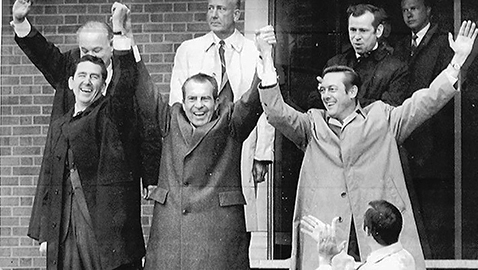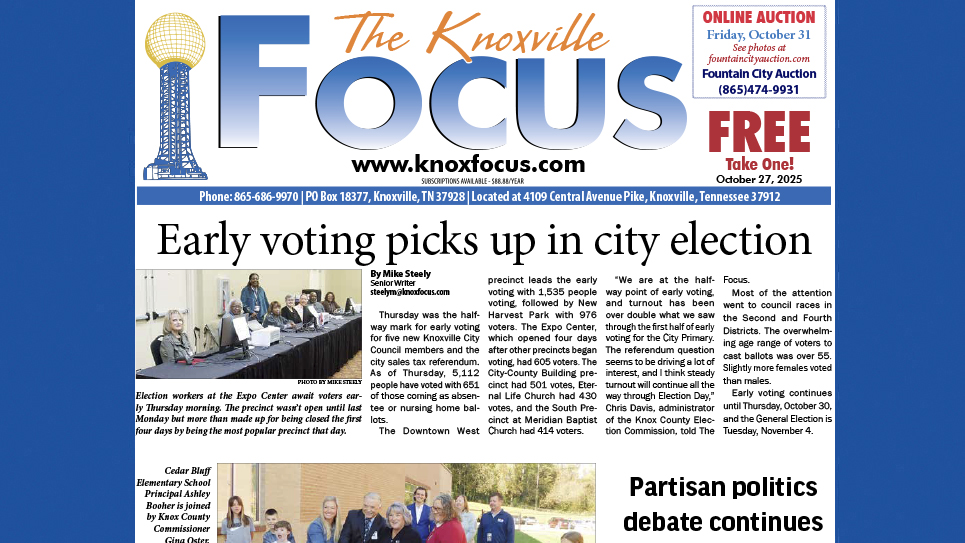By Ray Hill
Bill Brock formally announced his bid for a second term in Congress on June 1, 1964. Within weeks of Brock’s reelection announcement, “Bookie” Turner announced he was withdrawing from the Congressional race. Turner said he had only taken the plunge as a candidate “for the sake of party unity”, he promised to do all he could to help the Democratic nominee for Congress in the general election. Turner cautioned his fellow Democrats a divided party would only help Bill Brock in the fall campaign.
It was soon readily apparent the Democrats would not be united. Joe Hatcher was reporting in his column “Gov. Frank Clement and his machine ‘patronage’ boys in Chattanooga are throwing weight around in the Third District congressional primary – – – to the detriment of the Democrats and in favor of Republican W. E. (Bill) Brock’s reelection.” The Tennessean disliked Frank Clement almost as much as it disliked any Republican and rarely missed an opportunity to be critical of the governor and his administration. The fact Clement was a candidate for the United States Senate against Ross Bass was likely an added factor. The Clement administration aiding a Republican congressman’s reelection campaign would not make Democratic voters very happy. State Representative William Leader claimed the weight of the Clement administration was placed against him inside the Democratic congressional primary due to his opposition to the “high tax program” the governor had submitted to the legislature in 1963. Leader ignored the fact much of Clement’s increased expenditures were largely to benefit those individuals and special interest groups normally affiliated with the Democratic Party. Both Leader and Joe Hatcher flatly stated the Clement administration was supporting Robert Summitt for Congress inside the Democratic primary. Leader attempted to portray himself as a victim in a political drama most folks didn’t really care much about. “Because I vigorously fought the unneeded taxes in my legislative fight to protect the people who could least afford to pay these taxes, I am now confronted with the opposition of the machine,” Leader cried.
Tennessee Democrats had been confident of beating Bill Brock when the freshman congressman sought reelection in 1964. For months, partisan Democrats had been chortling Brock was doomed to defeat, yet before the primary elections in August, one of the Democratic contenders for the congressional nomination was crying foul. State Representative William Leader, who had won some notoriety for having opposed Governor Frank Clement’s legislative program, was bellowing he was being opposed by a vicious political machine. Doubtless Leader was attempting to revive memories of the machine loyal to Senator Kenneth D. McKellar and Edward H. Crump of Memphis. Leader accused Governor Clement, who was also a candidate for the United States Senate against Congressman Ross Bass, of heading the political machine he was denouncing. “I am certain people in this congressional district do not want Frank Clement to be able to vote and control their congressman,” Leader huffed.
It was certainly true some Democrats who supported Frank Clement during his comeback campaign of 1962 had supported Bill Brock against the Democratic nominee that same year. Joe Hatcher, the veteran columnist for the Nashville Tennessean, claimed the Clement supporters were hoping to lure Republicans into the Democratic primary in August where Bill Brock was unopposed. The Tennessean was a sharply partisan daily newspaper, which loathed Frank Clement and didn’t much like any Republican. Hatcher warned that Republicans might very well cross over and vote in the Democratic primary in the hope of nominating the “weaker Democrat for November…” Hatcher wrote, “It is also well known that the Clement state machine is dabbling in other state-wide and local elections all across the state where the ‘Little Crump’ machines still operate.” If Frank Clement had a political machine, it was not functioning very well; he had been elected governor again in the 1962 general election against Independent and Republican candidates without winning a majority of the vote.
William Leader’s worst fears were confirmed when he lost to Robert Summitt by more than 10,000 votes. As to Frank Clement’s machine, if it existed it broke down completely as the governor lost to Congressman Ross Bass won with just over 50% of the vote. Governor Clement won just over 35% of the vote in the Democratic primary while a third candidate tallied just over 13% of the ballots cast. The governor’s influence in Hamilton County (Chattanooga) was negligible, as Ross Bass carried it by almost 6,000 votes.
Bill Brock had worked assiduously to help build Tennessee into a two-party state; the Republicans had nominated strong candidates for both U. S. Senate seats. Dan Kuykendall, a businessman from Memphis, was nominated to face off against Senator Albert Gore, while Howard Baker, Jr. was chosen by GOP voters to run against Congressman Ross Bass.
Congressman Bill Brock kept up his commitment to the Tennessee Republican Party, traveling to Memphis to introduce Dan Kuykendall who was beginning a tour of the state. The Kuykendall rally was in Covington, Tennessee where the candidate spoke from the steps of the Tipton County courthouse. Republicans and Democrats alike ignored partisanship when Sergeant Alvin C. York died. One of the genuine true heroes produced by Tennessee, politics was forgotten and all heaped praise on Sgt. York. Bill Brock remembered York “as a symbol of the country’s strength in crisis and our national willingness to put our faith to its most solemn test.”
Republican presidential nominee Barry Goldwater came to Knoxville for a campaign appearance and Bill Brock joined senatorial candidates Howard Baker and Dan Kuykendall, as well as Congressman Jimmy Quillen, all of whom stood in the receiving line as Tennesseans greeted the Arizona senator. Howard Baker was impressed by the enthusiasm with which he was received by many voters, especially those in what had long been Democratic strongholds. Both Baker and Dan Kuykendall commented on the “grassroots upsurge” of conservatism, particularly in West Tennessee, which had once been “barren and devoid” of Republicans for generations.
Bill Brock was never slow to criticize his own party when he felt it had veered off course. Running again in a district that was certainly not yet solidly Republican, Congressman Brock charged the national Republican Party of having avoided the most basic issues facing the country during the campaign. “It is up to Republicans to bring these basic issues before the people, so that there can be an intelligent basis for the voters to make their decisions in November,” Brock said to a Republican gathering in Chattanooga. Part of Brock’s criticism was directed at Democratic vice presidential nominee Hubert Humphrey who had urged Republicans not make foreign policy an issue in the fall campaign.
Congressman Bill Brock and his opponent Robert Summitt appeared together at a women’s club in Cleveland, Tennessee. Summitt described himself as a “conservative Southern Democrat”, much like Brock’s predecessor in Congress, James B. Frazier, Jr. Summitt attempted to make Barry Goldwater’s notion of selling the Tennessee Valley Authority an issue, loudly proclaiming, “I am against the sale of TVA – – -any time – – – any year.” While some voters may have refused to support Goldwater because of his views on TVA, it may not have resonated with Tennesseans when it came to Congressman Brock, who was also opposed to the sale of the Tennessee Valley Authority. Senator Albert Gore tried the same tactic, saying Brock’s views on TVA would “wreck” the agency. The Tennessean was alarmed to note the Brock campaign seemed to be well ahead of Democratic efforts inside the Third Congressional District. The Brock campaign was reaching out to voters through “telephone calls, doorbell ringing, ‘politicking’ at shopping centers and on the streets…” All of those methods of campaigning later became commonplace, but were relatively new at the time.
Brock received a boost when former Vice President Richard Nixon flew to Chattanooga for a campaign appearance. Nixon duly praised Congressman Brock, as well as senatorial candidates Howard Baker and Dan Kuykendall. Brock’s opponent, Robert Summitt, suffered something of a setback to his campaign when he was taken ill while attending a horse show. Evidently suffering from appendicitis, Summitt was rushed to a local hospital.
At the end of October, the Tennessean gleefully reported 1964 might well have been the wrong year for Tennessee Republicans to make a push to capture statewide and local offices. According to staff writer Bill Kovach, polls indicated every Republican outside the First and Second Congressional Districts lagging behind their Democratic opponents, including Howard Baker and Dan Kuykendall. Congressman Bill Brock was allegedly running behind his own opponent as well. Goldwater at the top of the ticket certainly didn’t help matters, which one anonymous Republican operative readily admitted. “Barry Goldwater isn’t Ike. He isn’t even as strong a candidate as Nixon.”
Bill Brock recalls he harbored similar concerns during the 1964 election. Describing himself as a “fervent supporter of Goldwater”, the Congressman realized the Arizona senator was not faring much better in Tennessee than he was nationally. “Goldwater then came out against Social Security, the Civil Rights Act, and TVA. Three strikes,” Brock remembered. Ruefully, Brock said, “No way was Howard Baker going to overcome those odds, regardless of his considerable talent. Still he carried the flag, and did so beautifully. He earned the right to carry that flag two years later, a race he won.”
As the 1964 election closed, Senator Albert Gore campaigned throughout the Third Congressional District and his speeches hit both Goldwater and Congressman Bill Brock hard. “Your congressman,” Gore thundered to audiences, referring to grants and loans, which had aided counties inside the Third District, “voted against these kinds of programs, he wasn’t much help.” “You wouldn’t have gotten these things except you had a Democratic administration and Congress which supported these things,” Gore said. “We need a man from the Third District in Congress like Bob Summitt who will work and vote with us for progressive legislation rather than against us.”
Once again, there was a great deal of commentary in the Tennessee press that Congressman Bill Brock was in danger of losing. The Kingsport News wrote Brock was “seriously threatened” by Summitt’s candidacy. The Tennessean noted Brock faced steep odds and bucking the tradition of electing a Democrat from the Third District. Robert Summitt tried an eleventh hour accusation, damning Brock for making a contribution of $250 to a Republican congressional candidate in Tennessee’s Sixth District. Brock replied Summitt had not correctly interpreted the law, noting he had made contributions to the senatorial campaigns of both Howard Baker and Dan Kuykendall, as well as various GOP candidates in Tennessee.
Election Day proved most of the Tennessee press wrong, as well as political prognosticators who had forecast Bill Brock’s defeat. Brock won handily; while Barry Goldwater barely carried Hamilton County, Brock beat Robert Summitt 41,528 votes to 32.060. Bill Brock carried seven of the eleven counties comprising the Third Congressional District, winning 71,005 votes to 59,027. It was an impressive victory.
By comparison, John J. Duncan, running for his first term in Congress, beat Willard Yarborough in the heavily Republican Second District, 84,868 votes to 70,119. While Barry Goldwater lost Tennessee to Lyndon Johnson, Howard Baker only narrowly failed to defeat Ross Bass, winning over half a million votes and more than 47% of the vote. Dan Kuykendall, while not running as well as Howard Baker, still won 46% of the vote against Senator Albert Gore. Bill Brock had once again demonstrated he could overcome the odds to keep his seat in Congress.
Stories in this Week's Focus
- The Knoxville Focus for October 27, 2025
- Publisher’s Positions
- Catholic rallies in second half to beat CPA, 28-26
- The Gentleman From Maryland: Senator John Marshall Butler
- Owens rolls sizzling 825 series on ‘home’ lanes
- Cedar Bluff Elementary celebrates new turf play area
- The Knoxville Focus for October 20, 2025
- Publisher’s Positions
- County unveils monument to honor Tucker Blakely
- John G. Townsend of Delaware







